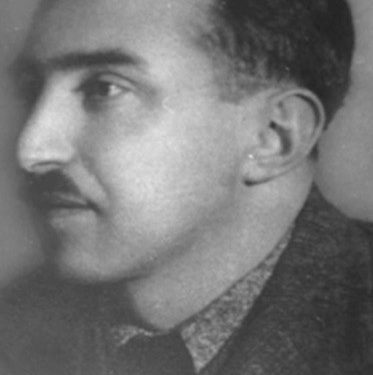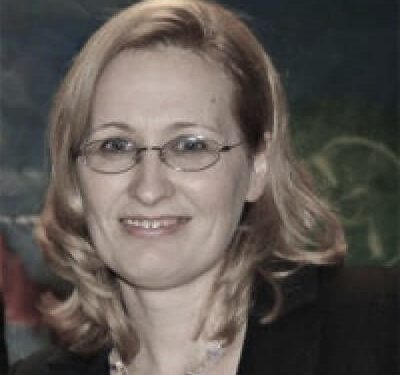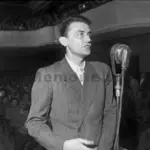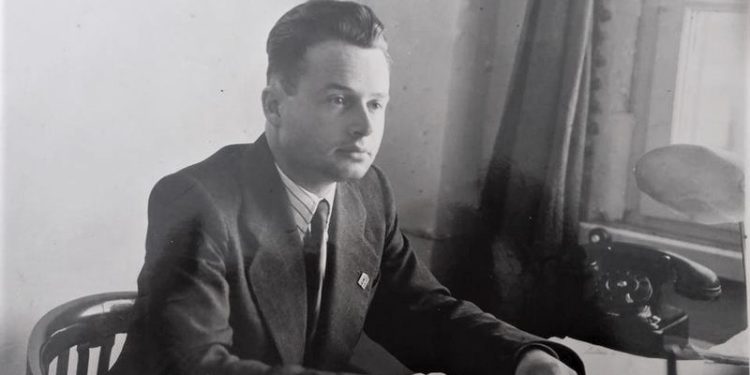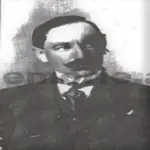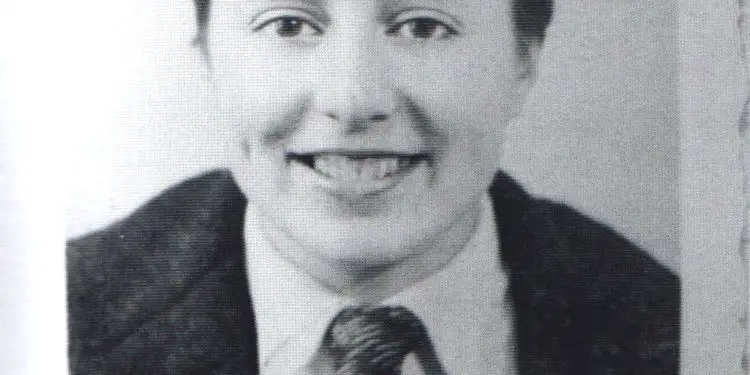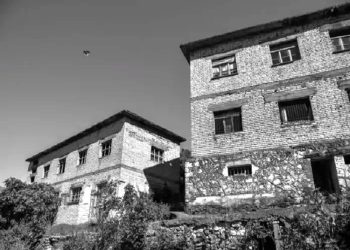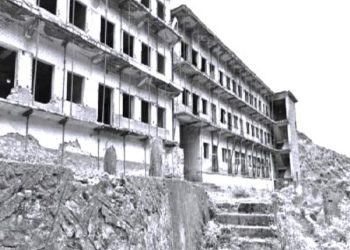Dr. Enriketa Pandelejmoni (Pope)
The first part
-Gjergj Kokoshi and his contribution, in an atypical political atmosphere in post-war Albania-
Memorie.al / In this paper, the figure of Gjergj Kokoshi will be treated, in the context of his political contribution, in the first year after the Second World War, based on mainly archival sources, from the Central State Archive and from Archive of the Authority for Information on Former State Insurance Documents. The aim is to carry out a study, based on archival sources and discourse analysis, to shed light on one of the most interesting and least understood figures in the first year of the consolidation of power by the Communist Party, such as Gjergj Kokoshi.
Gjergj Kokoshi was born in Shkodër in 1904, from Jaçim and Viktore Kokoshi, he graduated in Italy and France in philosophy and received his doctorate in Paris, in literature. During the 1930s, Kokoshi was a professor at the State Gymnasium in Shkodër and Tirana, known as an antizogist. In 1940, he was invited to participate in the First Conference of Albanian Studies, an event that served as the founder of the Royal Institute of Albanian Studies. He refused to participate in this conference, due to health reasons.
Essentially anti-fascist, Gjergj Kokoshi during the Second World War proved his affiliation with the National Liberation Movement led by the Albanian Communist Party. In 1943, he joined the National Liberation Front and was among the anti-fascist intellectuals, who were also involved in propagating anti-fascist ideas and spreading them to school youth. He participated in the armed resistance against the invader, in the area of Dibra, even after the Congress of Permet, he was promoted to colonel.
The name of Gjergj Kokoshi, the professor, started to be heard a lot after the Përmet Congress, the congress that laid the foundations of the communist regime in Albania. In this congress, he was elected one of the members of the National Liberation Anti-Fascist General Council, the legislative structure of the Albanian state government. He must have been nominated as the education officer during the days of the Congress, as his name appears in an unsigned document.
Officially, Kokoshi was appointed in charge of education on June 20, 1944 during the meeting of the General National Liberation Council held in Odriçan. Enver Hoxha introduced Kokoshi, with great praise. He pointed out the activity of Kokosh, as a participant of the National Liberation Movement, “as a man who has not made compromises and as competent and experienced in the field of education”.
At the second meeting of the National Liberation Anti-Fascist General Council, held in Berat on October 20-23, 1944, Kokoshi was appointed Minister of Education, in the provisional government led by Enver Hoxha, a position from which he resigned on January 13, 1945. of the Minister of Education, organized the Congress of Anti-Fascist Educators, which compiled the platform for the organization of education in Albania.
In this congress, Kokoshi’s view on the qualitative development of education in Albania clashed with Sejfulla Malëshova’s view on the massification of education. Also, Kokoshi had debates with Malëshova, also on the competences of the Ministry of Popular Culture, as in the case of the Institute of Studies that was under this ministry and not that of Education, as well as on the low amount that was dedicated to education in the budget of 1945, when previously according to Kokosh, 13% of the budget was reserved for education.
After the end of the Second World War in Albania, Kokoshi continued to be a member of the National Liberation Anti-Fascist General Council, which after August 1945 took the name Democratic Front. In September and early December of the same year, even though he was a member of the Democratic Front, he openly expressed his opposition to the new electoral law, which did not allow other parties to participate in the elections.
The first political elections of December 2, 1945
The Albanian provisional government after the liberation of Albania was not recognized internationally and one of the main objectives remained the consolidation of political power and its international recognition. The latter was refused to be done by the Western Allies, where especially the USA and Great Britain, had set as a condition the conduct of free and democratic elections.
The Communist Party (KPSH) had to first organize the local elections and then the national ones, with the aim of winning them through the appearance in the elections of the members of the National Liberation Front, behind which the Albanian Communist Party stood.
The elections of local bodies were held during the spring of 1945 and in them the NPSH managed to elect its own people, which it considered “experienced in war, determined and loyal to the interests of the people”, and to organize “the construction of the apparatus of new state, both in form and in Marxist-communist content, on new institutional and administrative bases, and people’s courts, the People’s Police and the Directorate of People’s Protection, which then turned into State Security bodies, were established, which will served the consolidation of the power of the NPSH and took the leadership of the state into their own hands, having previously eliminated the “representatives of the reaction”.
Gjergj Kokoshi ran in these elections in “Lagje e Re” in Tirana, but could not be elected and received only 17 votes. After the local elections of May 1945, the NPSH had to consolidate the central power and this was achieved through the transformation of the National Liberation Front into a political organization, which would emerge as the only political alternative in the central elections.
Before the elections, the National Liberation Front held its congress on August 3, 1945, where it was transformed into the Democratic Front and the Front was totally controlled by the NPSH, but there were also few non-communist elements. After the Congress, it was decided that the central elections would be held on December 2, 1945. But before them, on September 27-29, 1945, a meeting of the Anti-Fascist National Liberation Council (KANÇ) was held, in which the upcoming elections were mainly discussed and approved a legal package for them. The electoral law, the law on the Constituent Assembly and the law on voter lists were approved.
All three of these laws in some way limited the conduct of free elections, although the electoral law did not impose restrictions on the presentation of candidates from different political groups. Thus, the existence of a single political force such as the Democratic Front, led by the Communist Party, which did not allow the creation of other political groups, consequently turned Albania into a monist state.
The entire voting administration process, according to historian Sonila Boçi, was in the hands of the Anti-Fascist National-Liberation Front, as the electoral process was administered by the Front and the electoral commissions were chaired and in the absolute majority of them were members of the FANC, as well as the voting would be supervised by members of the Front’s councils, which undermined the transparency of the entire electoral process.
The elections would start at 7 am, until 7 pm, the head of the Central Election Commission would be Andrea Sahatçi and all the members of the commission came from the Front (Andrea Nathanaili, Faik Dishnica, Xhavid Gjata, Vasil Avrami, Halim Budo, Spiro Stringa). Even their substitutes were members of the Democratic Front (Salim Luniku, Irakli Nočka, Neki Delvina, Sotir Kuneshka, Vasil Bidoshi, Karaman Ylli and Eqrem Çabej).
These and some other ambiguities of the electoral law, caused general dissatisfaction for those individuals who intended to compete as independents in the December 2 elections, but also within the Anti-Fascist National-Liberation Front itself. Since the discussions on the drafting of the law, Gjergj Kokoshi, at that time Minister of Education, but also a member of the FANC Council, discussed the problems of the amended law, which was not compatible with democratic principles, and even came out against the approval of of this law, which violated the establishment of a democratic and pluralist regime. In the post-war conditions, this law did not allow educated and qualified people to contribute to their country.
The war had ended and now was the time to develop Albania according to democratic standards, and those people who, due to their political beliefs, were not members of FANC, should be given the opportunity to run for the general elections. . According to Kokoshi, the law did not give enough time to people and groups outside the Front to organize and present their lists and candidacies. The law simply favored FANC, and even the elections were under the control of the Front. Therefore, anyone who would compete in these elections, would do so against, not only the Front, a political organization, but against the state machinery.
This contradicted the principles of liberal democracy. Thus, it seemed that the Democratic Front was completely dominated by the NPSH and this fact was also known to the governments of the allies, for whom there were no illusions about the new regime and that the Albanian government for them was simply “a group of honest individuals, patriots, with whom there would be difficulties in cooperation”, since, according to the American representative in Tirana, Jacobs, “the officials were ignorant, as far as the science of government is concerned, knew very little about international relations and were very sensitive to the fact that , although they had fought against the same enemy, their government was still not recognized by the Allies, except Yugoslavia”!
It seems that before the December 2 elections, even within the Democratic Front itself, there was dissatisfaction and hesitation about the way the elections were conducted and the “freedom” to run outside the Front. The Albanian government had not yet been recognized by the Allies, so people outside the Front began to organize in the hope of competing in these elections, and even contacted people within the Front, or the National Liberation Council, such as Gjergj Kokoshi who, despite having been the Minister of Education after the war, he began to take a more critical stance towards government policies and withdrew from the post of minister.
In the meetings of the General Presidency of the National-Liberation Front, Kokoshi had several times expressed himself against harsh economic policies, which could be justified for war criminals, but could not continue to take strict measures and confiscation of property even against members of their family, especially in cases where the person in question had died, or even in the case of the extraordinary tax on war profits, to be careful with the application of this law, since the way it was developed as a procedure, the law had turned into a nightmare for traders.
This honorable political climate made Gjergj Kokoshin, who was young, think about his position within the Front and the possibility of his leaving, as he saw that all the work of the Front was being run only by the communists and the government was run only by the Communist Party. Therefore, the path followed by him to participate in these elections seems to have been that of leaving the lists of the Democratic Front. According to him, there was talk in public against the Front, that there was no freedom and that the country was under a dictatorship. In this spirit of dissatisfaction with the electoral politics of the Democratic Front and its aim to win the elections, Gjergj Kokoshi started trying to organize himself politically.
He had met several times with people who were trying to organize for the December 2 elections, such as; Shefqet Beja, Selahudin Toto, Riza Dani, Kosta Boshnjaku, Kol Kuqali, Irfan Majuni e Musine and Salim Kokalari, who, hoping for American support, wanted to form a clandestine party, with the principles of western democracies and wanted to extend their influence to the disaffected social strata, such as those affected by the new regime, merchants, landlords, landowners and intellectuals with opposite principles to popular power. But, according to the deposition of Shefqet Beja, after his arrest, it seems that, although Kokoshi was against and had opposed the electoral law in the Front, he proposed the establishment of an opposition and going out as a separate party, in the elections of December 2, 1945.
This proposal was not followed by the other members and according to Shefqet Beja, this was the difference between them, the opposition group that sought the support of the Americans, who had recommended to Beja and others that it would be better to stay within the ranks of the Front, than to leave. on his own, and Kokoshi, who seemed to lean more towards the British influence, broke away from the group of Shefqet Bey and Riza Dani. Likewise, Kokoshi was also a friend of Mirash Ivanaj and his cousin, Nikolla Ivanaj. He had often met in Tirana with Mirash Ivanaj, newly repatriated to Albania at the invitation of Kokoshi himself, as Minister of Education, on the possibility of organizing and appearing as a candidate in the elections of December 2.
Nikolla Ivanaj was thinking of running for office in Shkodër and was supported by Kokoshi and Mirashi, even the latter in the notes of the Ministry of the Interior, during the interrogation, was considered that together with Kokoshi, “were with the Front and the government, but more reserved, allegedly to give a more democratic appearance to the Front”. According to the notes in the Kokosh investigation file, Mirash Ivanaj noted that; “he told him that the Allies have declared that members of the National Anti-Fascist-Liberation Council are appointed and not elected”.
In the anti-KPSH political opposition
However, from his investigative-judicial file, pulled to the Authority for the Information of Former State Security Documents (AIDSSH), Kokoshi seems that the creation of an opposition party had an inherent purpose and he talked and met with different people, interested in its formation.
Thus, during the investigation, he testified that; “his political activity, for the formation of a Party, which would have the function of a constructive democratic opposition”, had started around October 15, 1945. During the Second World War even, as learned from Selahudin Toto’s form file, Kokoshi was unhappy with the extreme leftist elements that were in power.
For Kokoshi, the National Liberation War was not a one hundred percent movement of the extreme left. There were also moderates in it (the fact that the extremists took power, they didn’t like it and caused a lot of despair in many elements of the movement). Since he did not manage to get the necessary signatures to create the political group, he came into contact with other anti-communist and anti-Front people, who were at this time organizing for the elections.
He met in Tirana with various intellectuals, such as; Sami Qeribashi, Shaban Balla, Profi Čeko, Tut Mëniku, etc., to discuss the creation of a group which would compete in the December 2 elections. This political initiative of the aforementioned was joined by other people, who were interested in coming out separately from the Front, because the electoral law did not facilitate their candidacy, such as Musine Kokalari, who was the initiator of the social-democratic grouping, or Qenan Dibra, sympathizer of the monarchists.
It should be borne in mind that in the conditions of a political terror initiated with the special trials or “people’s courts”, of March 1945, initially against “war criminals”, continuing further with the anti-communists, mainly in the North of Albania, the climate in the country it was not so much in favor of political organizations outside the Front.
But, anyway, the pressure on the Albanian government to finally be recognized by all the Allies (the Soviet Union recognized the Albanian government on November 10, 1945), conditioned by the USA and Great Britain, with the conduct of free elections and democratic, and the permission of foreign journalists during the electoral campaign and on the day of the elections, were stimulating factors for the non-communist elements to organize and come up with concrete lists in the elections.
However, the pressure was extraordinary, considering the short time: from October 1, when the law was announced in the Official Gazette, and until the elections, only 2 months remained. Memorie.al
The next issue follows




